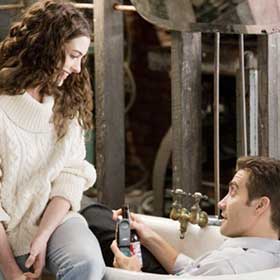Love and Other Drugs

1.5/5
In the weeks leading up to the release of Love and Other Drugs, you could hardly turn on a TV after 11:35 p.m. without seeing Jake Gyllenhaal or Anne Hathaway flashing their A-list smiles, coyly discussing their erotic sex scenes that were essential to the story. “I literally spent weeks naked in bed with Jake Gyllenhaal,” Anne tells Chelsea Handler, legs crossed, head tilted ever so slightly. “Just terrible work conditions,” she jokes. They would tell anyone who asked about the rigorous research that went into constructing the sex scenes, even watching movies that featured “real sex” before deciding that was “unnecessary.”
It was befuddling to understand why two of the most likeable and talented stars in the industry were degrading themselves to the promotional capacity of a porn star … for a movie about Parkinson’s Disease, which was touted as Oscar bait only a month earlier. But, after seeing the movie, it’s clear that there just isn’t much else to talk about. Gyllenhaal’s Jamie Randall—a charismatic, ambitious Viagra salesman—and Hathaway’s Maggie Murdock—a cynical artist with stage one Parkinson’s—are merely sketches of characters, and their moments are rarely earned. It isn’t Hathaway or Gyllenhaal’s fault—the stars were given a script that includes about as much depth and subtlety character to work with as clothing in their constant sex scenes.
As for the infamous sex scenes—they fall rather flat. No one could complain about watching Jake and Anne naked, but the sex scenes feel oddly mechanical and entirely unerotic, perhaps the result of focusing too much on their supposed “research.” And the scenes move the plot forward in only the most transparent ways. As you watch the actors try to make the most out of dull revelations—he has low self-esteem, she was wounded by a married paramour—it’s hard not to daydream about what the film could have been. Given its potential, Love and Other Drugs is easily one of the most disappointing films of the year.
The climax of the film centers around Hathaway’s Parkinson’s, although the issues surrounding the disease feel disconnected from the rest of the film. Her diagnosis is treated much like the fact that Julia Roberts is a prostitute in Pretty Women or that Katherine Heigl is afraid of commitment and skeptical of love in every film she’s in: an simplistic, plot-moving imposition that the male lead must overcome before making a dramatic, romantic gesture.
For Maggie, the disease manifests itself in a cynical world view and hands that sometimes shake when she tries to artfully cut Polaroids in unexplained collages. For Jamie, the diagnosis is outweighed by great sex. Since the audience never really feels a connection between them, the reconciliation at the end feels a bit confusing. Those who have seen Rachel Getting Married know that Hathaway can do just about anything, if given the material for it, and she certainly steals the movie when given moments that match her talent, but that only happens a handful of times.
As if Anne and Jake didn’t have enough to try to overcome, they also must contend with Josh Randall (played by Josh Gad), who has the film’s largest supporting role and happens to be one of the most annoying characters ever put on film. As Jake Gyllenhaal’s brother, his character’s motivations are inexplicable and his scenes are disgusting. He’s Jonah Hill without the humor or humanity. It’s difficult to decide which is harder to believe: that Josh could be genetically related to Jake Gyllenhaal or that director Edward Zwick actually believed he’d be a good addition to the film.
The film ends as you expect it will, but hope it doesn’t. Random strangers give profound advice, the lovers must overcome transportational issues to declare their love, and the movie closes with a song from Regina Spektor. Which just makes you want to ask: you’re already bringin’ down Jake and Anne—do you really have to bring Regina into this, too!?
RELATED ARTICLES
Get the most-revealing celebrity conversations with the uInterview podcast!







Leave a comment